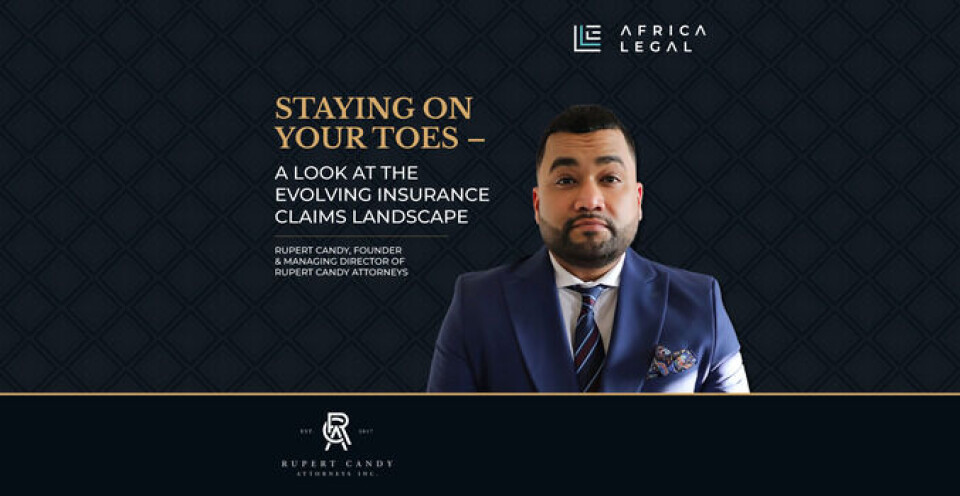From the global pandemic spotlighting terms of business interruption policies to the growing need for cyber insurance to shield against fresh threats in our digital age, it’s vital for lawyers and clients in the insurance realm to stay vigilant, says litigation and dispute resolution expert Rupert Candy.
“The risk environment is an evolving landscape,” explained Candy, the founder of award-winning Johannesburg firm Rupert Candy Attorneys Inc. “Nobody saw Covid-19 coming, and there were numerous Opinions from leading silks about whether cover would be extended for business interruption claims. Cyber insurance is also a major product at the moment, with insurers advising clients to upgrade their policies to add cyber liability cover. Some major companies have suffered data breaches, theft of personal information, “hacking” and phishing attacks.”
He highlighted that some law firms have also been victims of cyberattacks.
The insurance landscape is an ever-changing environment where insurers and insured – along with their legal advisors – need to “be on their toes” about what’s happening in the country and around the world, said Candy, whose boutique firm is shortlisted for an award at the 2023 African Legal Awards, and has previously won the Litigation and Dispute Resolution Team of the Year.
Rupert Candy Attorneys Inc was founded in 2017, after Candy had spent several years working at a senior level in insurance and dispute resolution at one of Africa’s largest firms. Candy says he wanted to create his own legacy, while providing clients with a boutique experience that had a strong focus.
“The nature of insurance is all about risk, with clients trying to mitigate risk,” explained Candy. “We are specialists in the litigation and dispute resolution space, mainly in respect of insurance and legal liability. For a small firm, we punch above our weight, doing work for local and international insurers, intermediaries, and brokers.”
While the firm are insurance specialists, this doesn’t mean their practice completely revolves around insurance law. The firm has also developed a solid reputation in media law, sports law, and constitutional law.
“Most of our clients are insurers, and we sometimes represent their insured parties in court where claims are made against them which are covered by an insurance policy,” Candy clarified. “In those cases, it’s quite often not insurance law per se that’s at play – the person may have been sued in respect of another law. For example, in terms of a directors and officers liability policy, we defended a group of whistleblowers who exposed corruption at a state-owned company and the company subsequently launched a litany of civil legal proceedings against them.” Those defendants also faced trumped-up criminal charges, noted Candy, which were subsequently withdrawn.
The firm also acts for professional indemnity insurance providers, and has represented professionals such as fellow attorneys, medical doctors, social workers and so on. The firm currently has matters before both the High Court, and, separately, before the various Professional Conduct Bodies insured parties belong to.
Other claims the firm encounters involve workplace accidents, public liability, environmental law or a range of other legal issues. “The type of work we do is wide-ranging,” he added, noting that while arbitration and mediation are becoming more popular, when it comes to insurance matters many people are continuing “the traditional approach of going to court to sue or to defend”.
Regarding some of the challenges faced by the firm’s clients, Candy added “an ongoing concern relayed to us is that, from an underwriting perspective, businesses do not entirely disclose the material risk in their business, which impacts risk profiling.”
Further, Candy added, “despite some intermediaries holding licences to provide services to insurers and policyholders, insurers sometimes have to provide further training, especially to new market entrants which they have formed partnerships with. Naturally, this can be time-consuming”.
To join Africa Legal's mailing list please click here

